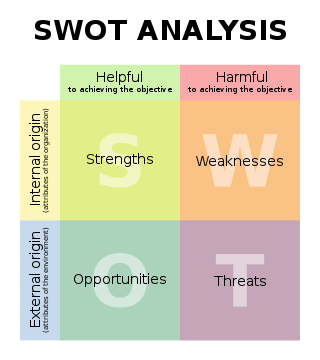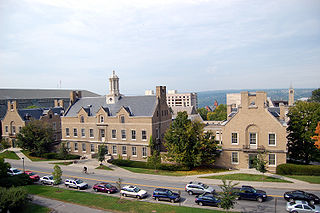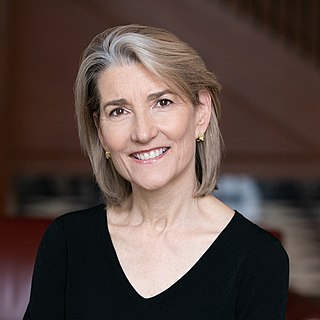
SWOT analysis is a strategic planning and strategic management technique used to help a person or organization identify Strengths, Weaknesses, Opportunities, and Threats related to business competition or project planning. It is sometimes called situational assessment or situational analysis. Additional acronyms using the same components include TOWS and WOTS-UP.

The New York State School of Industrial and Labor Relations at Cornell University (ILR) is an industrial relations school and one of Cornell University's four statutory colleges. The School has five academic departments which include: Labor Economics, Human Resource Management, Global Labor and Work, Organizational Behavior, and Statistics & Data Science.
Human resource management is the strategic and coherent approach to the effective and efficient management of people in a company or organization such that they help their business gain a competitive advantage. It is designed to maximize employee performance in service of an employer's strategic objectives. Human resource management is primarily concerned with the management of people within organizations, focusing on policies and systems. HR departments are responsible for overseeing employee-benefits design, employee recruitment, training and development, performance appraisal, and reward management, such as managing pay and employee benefits systems. HR also concerns itself with organizational change and industrial relations, or the balancing of organizational practices with requirements arising from collective bargaining and governmental laws.
Organizational behavior or organisational behaviour is the: "study of human behavior in organizational settings, the interface between human behavior and the organization, and the organization itself". Organizational behavioral research can be categorized in at least three ways:
Marshall Goldsmith is an American executive leadership coach and author.
A chief human resources officer (CHRO) or chief people officer (CPO) is a corporate officer who oversees all aspects of human resource management and industrial relations policies, practices and operations for an organization. Similar job titles include: chief people officer, chief personnel officer, executive vice president of human resources and senior vice president of human resources. Roles and responsibilities of a typical CHRO can be categorized as follows: workforce strategist, organizational and performance conductor, HR service delivery owner, compliance and governance regulator, and coach and adviser to the senior leadership team and the board of directors. CHROs may also be involved in board member selection and orientation, executive compensation, and succession planning. In addition, functions such as communications, facilities, public relations and related areas may fall within the scope of the CHRO role. Increasingly, CHROs report directly to chief executive officers and are members of the most senior-level committees of a company.
Talent management (TM) is the anticipation of required human capital for an organization and the planning to meet those needs. The field has been growing in significance and gaining interest among practitioners as well as in the scholarly debate over the past 10 years, particularly after McKinsey's 1997 research and the 2001 book on The War for Talent. Although much of the previous research focused on private companies and organizations, TM is now also found in public organizations
Richard Eleftherios Boyatzis is a Greek-American organizational theorist and Distinguished University Professor in the Departments of Organizational Behavior, Psychology, and Cognitive Science at Case Western Reserve University, Adjunct Professor in People/Organizations at ESADE, as well as HR Horvitz Professor of Family Business. He is considered an expert in the field of emotional intelligence, behavior change, and competence.
Business acumen, also known as business savviness, business sense and business understanding, is keenness and quickness in understanding and dealing with a business situation in a manner that is likely to lead to a good outcome. Additionally, business acumen has emerged as a vehicle for improving financial performance and leadership development. Consequently, several types of strategies have developed around improving business acumen.
E-HRM is the planning, implementation and application of information technology for both networking and supporting at least two individual or collective actors in their shared performing of HR activities.
Capability management is the approach to the management of an organization, typically a business organization or firm, based on the "theory of the firm" as a collection of capabilities that may be exercised to earn revenues in the marketplace and compete with other firms in the industry. Capability management seeks to manage the stock of capabilities within the firm to ensure its position in the industry and its ongoing profitability and survival.
A competency dictionary is a tool or data structure that includes all or most of the general competencies needed to cover all job families and competencies that are core or common to all jobs within an organization. They may also include competencies that are more closely related to the knowledge and skills needed for specific jobs or functions.
Competency-based recruitment is a process of recruitment based on the ability of candidates to produce anecdotes about their professional experience which can be used as evidence that the candidate has a given competency. Candidates demonstrate competencies on the application form, and then in the interview, which in this case is known as a competency-based interview.
Human resource planning is a process that identifies current and future human resources needs for an organization to achieve its goals. Human resource planning should serve as a link between human resource management and the overall strategic plan of an organization. Ageing workers population in most western countries and growing demands for qualified workers in developing economies have underscored the importance of effective human resource planning.
Human Resource (HR) metrics are measurements used to determine the value and effectiveness of HR initiatives, typically including such areas as turnover, training, return on human capital, costs of labor, and expenses per employee.

Howard M. Guttman is an American management consultant and founder of Guttman Development Strategies, a consulting firm. Guttman is best known for his theories on corporate organizational hierarchies, positing that the traditional, top-down model of management is less effective than the horizontal, high-performance organization, where decisions are made by cross-functional teams with equal authority.

Leonard A. (Len) Schlesinger is an American author, educator, and business leader. He is currently the Baker Foundation Professor at Harvard Business School and President Emeritus of Babson College where he served as the college's 12th President from 2008 through 2013.

Amy C. Edmondson is an American scholar of leadership, teaming, and organizational learning. She is currently Professor of Leadership at Harvard Business School. Edmondson is the author of seven books and more than 75 articles and case studies. She is best known for her pioneering work on psychological safety, which has helped spawn a large body of academic research in management, healthcare and education over the past 15 years. Her books include "Right Kind of Wrong, the Science of Failing Well", “The Fearless Organization,Creating Psychological Safety in the Workplace for Learning, Innovation, and Growth” (2018)) and “Teaming: How Organizations Learn, Innovate and Compete in the Knowledge Economy” (2012).
Doirean Wilson is a British academic who is Diversity Lead at Middlesex University London, and a Senior Lecturer specialising in Strategic HRM, Professional Practitioner and Community Engagement. She has written widely from her expertise on diversity in teaching and learning, and has edited and contributed to many publications.
Mark A. Huselid is a university professor, workforce management specialist, book author, and business consultant. He is the Distinguished Professor of Workforce Analytics at D'Amore-McKim School of Business, Northeastern University. He has authored research papers and books regarded as seminal to establishing a strategic link between human resource management and business performance.





